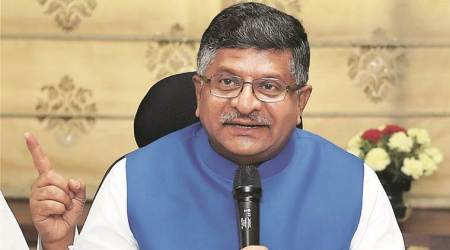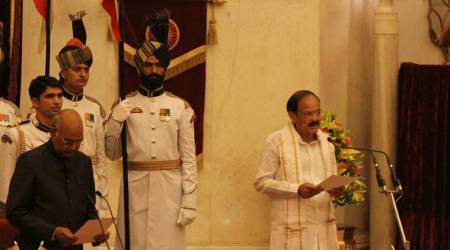 Research body PRS Legislative Research differed from these assessments: it said Lok Sabha worked for 67% of its scheduled hours and Rajya Sabha for 72%. (Source: Express photo by Ravi Kanojia/File)
Research body PRS Legislative Research differed from these assessments: it said Lok Sabha worked for 67% of its scheduled hours and Rajya Sabha for 72%. (Source: Express photo by Ravi Kanojia/File)
The monsoon session of Parliament, which witnessed the election of President Ram Nath Kovind and Vice President M Venkaiah Naidu and a significant political realignment, ended Friday with both houses registering between 75% and 80% productivity, according to official figures.
Parliamentary Affairs Minister Ananth Kumar said Rajya Sabha worked for 79.95% of its scheduled hours during the 19-day session while Lok Sabha sat for 77.94% of its scheduled hours. Due to disruptions over various issues, Lok Sabha lost 29 hours 58 minutes and Rajya Sabha nearly 25 hours.
Research body PRS Legislative Research differed from these assessments: it said Lok Sabha worked for 67% of its scheduled hours and Rajya Sabha for 72%.
Both Houses witnessed heated debates between the Opposition and Treasury benches on issues from cow slaughter, lynching and mob violence to agrarian crisis and an attack on Congress vice-president Rahul Gandhi in Gujarat, allegedly by BJP workers.
The session saw a major political realignment following the presidential election. The BJP, which had been worried about its minority strength in Rajya Sabha, received a shot in its arm when it became the single largest party during the session, overtaking the Congress by one seat. The BJP’s strength has gone up to 58, overtaking the Congress’s 57 with the election of Sampathiya Uikey from Madhya Pradesh. Uikey, a tribal leader, took oath as Rajya Sabha member on Thursday. The ruling party has often faced an aggressive opposition when it has come to legislation as well as debates.

It was during this session that the NDA got Bihar’s ruling JD(U) back on its side after Nitish Kumar broke his alliance with the RJD.
The session also CPM leader Sitaram Yechury, who had often led the Opposition in its criticism against the government, retiring from Rajya Sabha.
Another significant development for the ruling party in Parliament was the entry of BJP chief Amit Shah into Rajya Sabha. With Prime Minister Narendra Modi also expressing confidence that his presence would make party MPs more diligent and disciplined, Shah is expected to play a key role in getting the party and its allies to act more cohesively in the upcoming sessions.
The session saw six Congress MPs getting suspended for five days for hurling papers at the chair, termed “highly unbecoming” behaviour”. The suspended Congress members were Gaurav Gogoi, K Suresh, Adhir Rajan Chowdhury, Ranjeet Ranjan, Sushmita Dev and M K Raghavan.
“The monsoon session has been a successful session in terms of the legislative business conducted and wide participation of all political parties in discussions on various issues of national importance,” Ananth Kumar said.
During the session, 17 bills were introduced in Lok Sabha and 14 were passed, while 9 were passed in Rajya Sabha, Ananth Kumar said.
“This is an achievement considering it was a short session and a considerable time was devoted to discussions on important issues and elections to the offices of President and Vice President” he said.
He mentioned the special sitting that was organised to mark the 75th anniversary of the Quit India Movement during the session. The Union minister termed the extension of GST to Jammu & Kashmir as a “historic achievement” and said passing of related bills will lead to economic integration of the state with the rest of the country.
Among crucial bills introduced during the session were the Banking Regulation (Amendment) Bill and the Right of Children to Free and Compulsory Education (Second Amendment) Bill. Key legislation such as the Companies (Amendment) Act 2016 and the NABARD (Amendment) Act 2017 were passed by Lok Sabha.

